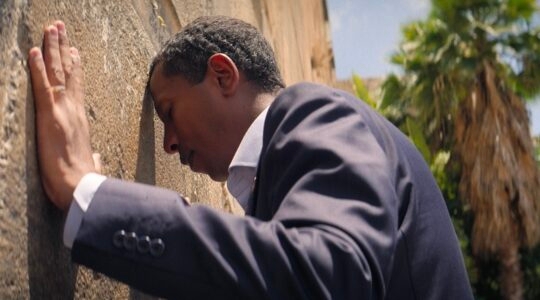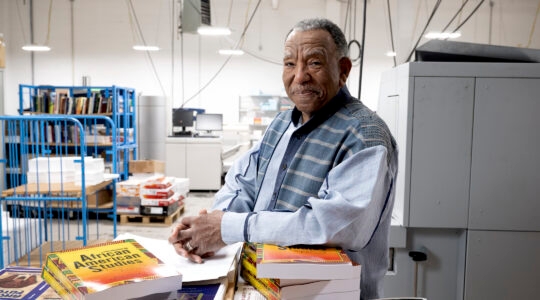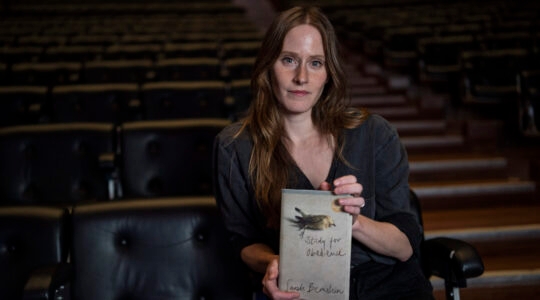Sunday night brough two big D.C. power players to New York for Jewish events: Eric Cantor, the only Jewish Republican in Congress and House minority whip, spoke at the ZOA annual dinner, and Lawrence Summers, the former treasury secretary and Harvard president who now serves as President Obama’s senior economic adviser, addressed Yeshiva Univeristy’s convocation.
The full text of both speeches after the jump.
[[READMORE]]
Cantor:
Thank you Martin. Thank you all.
I’m honored by your recognition, and humbled by the challenges before us.
Sixty-one years ago, the signers of Israel’s Declaration of Independence issued a clarion call to the Diaspora. That call is as urgent today as it was then:
“We appeal to the Jewish people throughout the Diaspora to rally around the Jews of Eretz-Israel…. and to stand by them in the great struggle for the realization of the age-old dream // – The redemption of Israel.
Answering this plea has helped sustain the Jewish state. And now, more than ever, Israel and America face dire existential threats from our enemies.
We must stand up and allow our VOICES TO BE HEARD!!!
It often seems that Washington cannot stay focused and their attention darts from one thing to the next. ZOA is at the forefront of our struggle, to make sure a strong U.S.-Israel relationship remains a top priority.
My message to you tonight is simply this: We MUST answer our enemies’ dangerous resurgence with renewed vigilance, lest we invite greater dangers for both Israel AND the United States.
To illustrate, I’d like to share with you three short stories.
The first is an observation by Claude Lanzmann, a gifted film maker whose documentary Shoah is a definitive film statement on the Holocaust.
Interviewed on French television, he was asked – almost contemptuously – what was the purpose to his film? Surely everything that could be said about the Holocaust had already been said.
“Well,” he replied, “I discovered, that for myself at least, one question remained unasked: at what moment did it become too late?
Clearly it was too late when the shivering, naked victims were herded in to the gas chambers. It was too late when they were being stuffed into cattle cars.
At what moment did we lose the chance to save the six and a half million souls? 1936? The Nuremberg Laws? The Versailles treaty?
When did it become too late?”
My second anecdote is from Martin Gray who wrote movingly of his escape from Treblinka in “For Those I Love."
Making his way across Poland and into Germany in the hope of reaching Switzerland – unaware Swiss border guards returned Jewish refugees to the Nazis – he came to the edge of a forest.
Peering out, he saw a work gang of some two hundred German Jews guarded ONLY by TWO SS.
Certain that the Jews could overpower their captors, Gray was about to run from the woods and rally them, when an SS truck arrived to take the two guards to lunch.
Before leaving the slave workers, the SS commander threatened “work hard or there will be severe punishment” on his return. And off went the SS, leaving the Jews UNGUARDED.
Martin Gray ran from the woods shouting “Come! Come! You must leave now!” The Jews in the work gang seemed puzzled, unwilling to upset their German captors.
Gray said, “You’re doomed! They’re killing the Jews of Europe. They’re silencing us all.”
They laughed. “Don’t be silly! We’re nearly seven Million! Impossible!” Gray insisted no, it was true. He described Treblinka. The work gang was unmoved.
Finally one of the prisoners said, “Your accent is strange. Where are you from?” “Poland,” Gray answered. “Oh,” they said, “No wonder. We’re German Jews. We’ll be fine.”
My third and final cautionary tale is from the esteemed author Primo Levi. When asked what he learned from the Holocaust, he replied, “When a man with a gun says he’s going to kill you – believe him.”
Why these three stories? Because many men are pointing guns at Israel – indeed, at Jews everywhere.
Too many American Jews have become desensitized to the fires that threaten the Jews of Israel and of Europe.
“It can’t happen to us,” they think, as if the egregious anti-Semitic vitriol surging across the internet and spewing onto American college campuses is of no meaning…
As if somehow we will be unharmed by the lies spread about Israel and the Jewish people. But the key is Mr. Lanzmann’s plaintive question: // “When is it too late?”
When Hamas is welcomed, even celebrated, in world capitals, and we avert our eyes, it may be too late.
When the U.N. sanctioned Goldstone Commission accuses Israel of War Crimes, essentially stripping it of its right to defend itself against terrorism, and we do not cry out, it may be too late.
When Turkish government T.V. airs a series showing fabricated accounts of Israeli soldiers shooting babies in Gaza, and we don’t call them out, it may be too late.
Or when Scandinavia’s largest newspaper publishes a story that Israel steals and traffics in Palestinian body parts, and the blood libel is repeated across the Middle East, yet we do not protest, it may be too late.
When we allow ourselves to be lulled into silence when political correctness beckons, IT MAY BE TOO LATE.
How late is it when the United States asks to open discussions with Ahmadinejad, the man holding the gun with which he vows to kill Israel and the Jews?
Each day that passes brings us one step closer to his possession of a nuclear bomb – the ultimate weapon.
Have we not been down this road before?
When we dally, and fret, and wring our hands but fail to do anything that will really stop him, how late are we then?
Where is our outrage at the world’s growing acceptance of Hugo Chavez, who welcomes the Iranians to Caracus, then denounces Israel as an evil to be destroyed, and simultaneously badgers and persecutes the Venezuelan Jewish community?
Why are we silent? If we close our eyes to this, IT IS CERTAINLY TOO LATE.
That is our challenge: to remove the blinders from our eyes, to honor the great heritage of American freedom by protecting it.
This is vital: The case I press before you now is not a “Jewish cause” or an “Israeli issue”. These are challenges to America.
Israel’s security is synonymous with our own. The people who point guns at her with murder in their eyes will next turn on us.
Her enemies are our enemies – and polite silence amounts to complicity in our own demise.
The urgency is to discard ideologies, to look at the real world, and let that dictate policy. In Israel’s tough neighborhood, only strength is admired – and weakness only despised.
In its 61st year, the State of Israel – always supported by the nurturing hand of America and decent, right-minded people everywhere, is in dire straits, mortal danger.
Expedience has sadly weakened certain old, reliable allies. The infection has overwhelmed the so-called United Nations and has even reached our Universities and too much of our media.
In Europe and even here in Washington, leaders of the Palestinian Authority are gaining support for their bid to unilaterally declare statehood even without having to recognize the Jewish State of Israel.
To the resounding voice of history, let us all lend an ear. Let us resist the complacency that comes with past success. ZOA has always been in the forefront of our struggle – and you must continue the fight.
I, and millions like US- of many faiths, cultures, and political persuasions – await your leadership…… before it is too late.
Thank you.
Summers:
Thank you. I am grateful for the honor you have bestowed upon me today; for the kind and overly flattering words in your citation, President Joel; for your friendship and for the friendship of this community; and for the honor of being part of this distinguished group recognized tonight. I am proud to stand with the Yeshiva community, for I know well how important your work is at a critical time in the life of the Jewish people.
I had prepared a set of remarks today on the importance of the work that colleges and universities do – about the difference they can make and about the reality that just as our country is in constant need of renewal, so too must our institutions of higher education be renewed.
I will return to these issues in a few moments. But first, I want to tell you why they have a special meaning for me today. My uncle, the economist Paul Samuelson, died this morning at the age of 94 after a long, happy, and remarkably productive life.
Paul once remarked that he had never spent a full week in Washington, D.C. But through his teaching, writing, and research, I am convinced that he had more impact on the economic life of this country and the world than any government economic official and many Presidents.
That Paul, who spent his entire career in a university, could have such an impact is testament to the importance of institutions like this one.
Colleges and universities are gateways to opportunity.
Paul’s family struggled during the Depression. Only a scholarship enabled him to attend the University of Chicago, and only a fellowship enabled his graduate study at Harvard. And in those days, tuitions were much smaller relative to family incomes than they are today.
By the early 1940s, Paul had an international reputation as a brilliant economist. He had solved problems economists had struggled with for decades. It is said that after the oral exam for his PhD, his examiners asked him whether they the examiners had passed or not. Yet Harvard did not, in those days, make any move to award him a professorship. Perhaps the Economics Department was singularly inept in judging talent, or perhaps they were not at that time ready for a brash young Jewish economist.
That kind of prejudice with respect to Jews, with respect to African Americans, or with respect to other minority groups is largely absent from American universities today. That is a huge accomplishment. There are many more scholarships available today than there were when Paul went to college, or for that matter when I went to college. But as a country, we are a long way from the point when we can claim that merit trumps background in higher education.
Consider this: less than 10 percent of the students at leading colleges and universities come from families in the lower half of the income distribution – an 80 percent underrepresentation, far worse than any other disadvantaged group in our society.
We once celebrated that the United States led the world in the fraction of adults who graduated from college. Today, we are, as a country, no longer in the top 10 in the fraction of college graduates among those 25 to 34.
The gaps in attendance and graduation rates between children of poor, middle-class, and rich families have risen over the generation. The author of one study put it very bluntly and said, “The dumbest rich kids have as much chance of going to college as the smartest poor kids.”
California last week announced that tuition was going up by one-third next year. That’s why I am proud that I could lead Harvard’s commitment to eliminate tuition for families with incomes under $60,000. That’s why President Joel did something hugely important when he froze tuition here at Yeshiva. And all those here who helped make it possible for students not of means to attend this wonderful college are doing something profoundly important. That’s why increases in assistance for scholarships are one of the most important parts President Obama’s budget.
When we talk about renewal, we must remember that we will not be the kind of country we can be until there is equal opportunity in American higher education. Talent – not background – must determine the distribution of rewards in 21st-century America.
Universities and colleges provide the new thinking that drives progress.
Paul’s doctoral thesis was published under the title Foundations of Economic Analysis. It established analytical economics in its current form by introducing mathematical approaches to solving problems. Referring to the earlier tendency of economists to analyze what were basically mathematical ideas without equations he referred to their “mental gymnastics of a particularly depraved type.”
Does research matter? The work in that book, the work of that time, provided the framework for almost all our contemporary debates – whether the question was the impact of free trade on workers’ wages, the determinants of asset prices, the rationale for taxing and public spending, the basis of long-term growth, or how best to combat recessions.
It’s true what we say about thinking in almost every field. A quarter-century from now, we will think about disease very differently from how we do today. Cancers will be characterized by biological type, not bodily location, and this will point towards far more potent cures. Stem cells will point the way towards cures for diabetes and other metabolic diseases. New medicines will further accelerate the downtrend in heart disease, and potent new approaches will have been found to the scourge of Alzheimer’s. And we will have new overall approaches to the aging process itself.
None of this would happen without the basic research that takes place in universities and colleges. It’s true in every field. Often the most abstract inquiries yield the greatest fruit. Pure mathematics is the most abstract of the sciences. Number theory is the most abstract part of mathematics. All of us take ATM machines for granted. Yet they could not be secure without algorithms based on cutting-edge number theory research of the 1980s.
We are living through, as we confront this financial crisis, powerful testament to the impact of academic ideas and those who disseminate them. It was believed many years ago, and some still believe today, that free markets are self-equilibrating systems. That logic is what we start with in introductory economics courses. There is too much wheat, supply exceeds demand, the price of wheat falls, people plant less wheat, people mill more bread, and the market re-equilibrates. There is a shortage on the demand for credit, interest rates fall, investment rises, saving declines, and the market re-equilibrates.
It’s a powerful idea, and it’s right – most of the time. But Keynes wrote his book, The General Theory, and Paul Samuelson wrote his textbook – that, based on experience, I would guess a hundred people in this room studied from – to bring the Keynesian idea that it wasn’t always so to America. Several times a century, and this is one of those times, vicious cycles take hold: prices fall, people are forced to sell because of debt, prices fall further, more people are forced to sell, incomes go down, spending goes down, other people’s incomes goes down, and spending goes down. Vicious cycles take over. There is an avalanche, not a thermostat. Equilibrium cannot be restored without strong policies from the outside – without actions by the government, without actions of the kind that we tried to take, and have taken with some success, over the last year.
But none of it would be possible without research.
Paul once said, “Let those who will, write the nation’s laws, if I can write its textbooks.” He did, and he proved it with the phenomenal success of his own book.
Isaiah Berlin wrote that “philosophical concepts nurtured in the stillness of a professor’s study could destroy a civilization.” Talk to those who led the Velvet Revolution, brought down the Soviet Union, or stood up in Tiananmen Square, and they will speak to the importance of the writings of philosophers, of scientists, of economists on their lives.
Universities and colleges – and perhaps this is most elemental – prepare leaders.
It is a great privilege and a great responsibility of all of us involved with colleges and universities to impact on young people at the most malleable point in their lives. People do unlearn much of what they learn as children, and few of us change our minds about very much after we are 30. After our parents, those we interact with during the college years are often most important in our lives.
Paul said he was born as an economist after he heard a University of Chicago lecture on Malthus in 1935. And he had many intellectual children of his own: Nobel Prize winners Klein, Merton, Stiglitz, and Akerlof, along with the current chairmen of the central banks of the United States, United Kingdom, and Israel, to name just a few. There were hundreds more whose careers were shaped by his teaching and thousands for whom he was an intellectual grandfather, having taught their teachers.
I was reminded of what a difference teachers make last week when I got a call from my sophomore daughter, breathless with excitement and pride after a teacher had called her in to compliment her paintings and encourage her to pursue an artistic career. Every day, places like Yeshiva turn on a light in young people who go on to bring light to the world.
College educations, though, are not just about the development of the intellect, not just about finding a passion or developing self-confidence. At its best – and at institutions like this one, it may be at its best – education is about the development of moral habits for a lifetime: care for the weak, integrity, high standards, and, I believe above all, being willing to challenge any dogma or strongman.
For there will always be evil and evildoers in the world. We will not in our time on earth change that. What we can change is making sure that they do not triumph. And the best way to do that is to make sure that we establish absolute the norm that truth is not decreed by authority, but approached through reason and argument. And it is communities committed to progress, to freedom, to reason – communities like this one that are the best bulwarks against evil and sources of progress that the world has yet found.
Paul Samuelson’s entire professional life was lived within a university. It is not given to most of us to make the kind of difference that he did, but it is given to all of us to be part of institutions of higher education. And in their renewal, lies the renewal of our nation at a crucial juncture in its history.
Thank you very much.

Help ensure Jewish news remains accessible to all. Your donation to the Jewish Telegraphic Agency powers the trusted journalism that has connected Jewish communities worldwide for more than 100 years. With your help, JTA can continue to deliver vital news and insights. Donate today.





